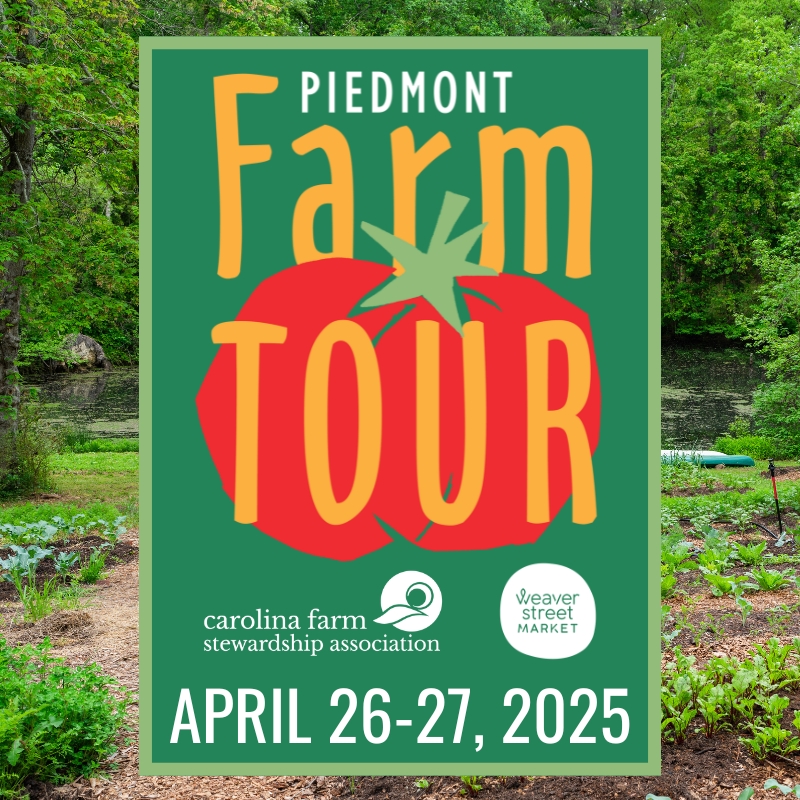Conservation in Action: NCCOP Partners with CFSA Piedmont Farm Tour
go.ncsu.edu/readext?1067869
en Español / em Português
El inglés es el idioma de control de esta página. En la medida en que haya algún conflicto entre la traducción al inglés y la traducción, el inglés prevalece.
Al hacer clic en el enlace de traducción se activa un servicio de traducción gratuito para convertir la página al español. Al igual que con cualquier traducción por Internet, la conversión no es sensible al contexto y puede que no traduzca el texto en su significado original. NC State Extension no garantiza la exactitud del texto traducido. Por favor, tenga en cuenta que algunas aplicaciones y/o servicios pueden no funcionar como se espera cuando se traducen.
Português
Inglês é o idioma de controle desta página. Na medida que haja algum conflito entre o texto original em Inglês e a tradução, o Inglês prevalece.
Ao clicar no link de tradução, um serviço gratuito de tradução será ativado para converter a página para o Português. Como em qualquer tradução pela internet, a conversão não é sensivel ao contexto e pode não ocorrer a tradução para o significado orginal. O serviço de Extensão da Carolina do Norte (NC State Extension) não garante a exatidão do texto traduzido. Por favor, observe que algumas funções ou serviços podem não funcionar como esperado após a tradução.
English
English is the controlling language of this page. To the extent there is any conflict between the English text and the translation, English controls.
Clicking on the translation link activates a free translation service to convert the page to Spanish. As with any Internet translation, the conversion is not context-sensitive and may not translate the text to its original meaning. NC State Extension does not guarantee the accuracy of the translated text. Please note that some applications and/or services may not function as expected when translated.
Collapse ▲Seeing conservation practices in action provides a powerful learning experience, and it allows you to build connections between sustainable farming principles and real-world applications. The NC Conservation Outreach Project (NCCOP) has partnered with the Carolina Farm Stewardship Association (CFSA) for this year’s Piedmont Farm Tour to showcase NRCS conservation practices in action. Visitors to participating farms can expect to:
- Gain knowledge about NRCS conservation practices,
- See real-world implementations on working farms, and
- Learn how these practices improve farm sustainability and profitability.
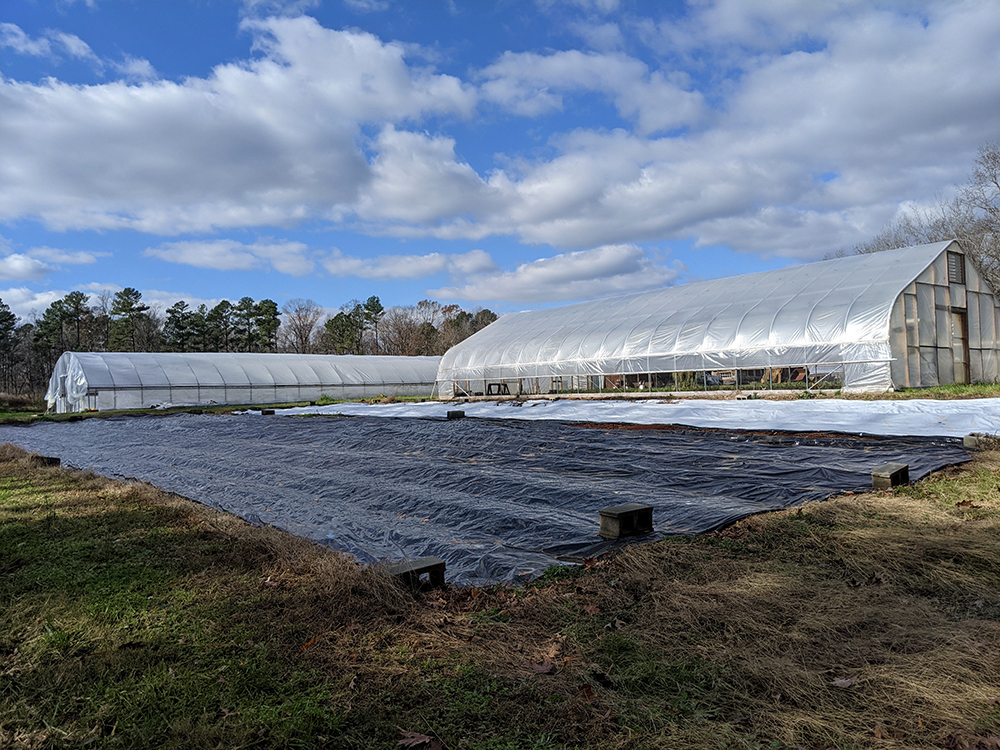
Meredith Leight of Granite Springs Farm in Pittsboro will be showing off the high tunnels that she built with support from the NRCS.
This partnership helps demystify conservation practices for producers interested in agriculture, sustainability, environmental stewardship, and soil health. By visiting these demonstration sites, you’ll witness firsthand how these practices benefit both farms and the wider ecological landscape.
This is a great opportunity for farmers and agricultural professionals who want to implement conservation practices on their own land. Do you have:
- An interest in improving your farm’s sustainability?
- A commitment to environmental stewardship?
- A desire to learn about conservation funding opportunities?
- An interest in improving your farm’s long-term profitability?
- A willingness to implement new practices?
If you do, we encourage you to visit these farms! NCCOP supports farmers who can innovate, adapt, and lead their communities toward more sustainable agricultural systems.
Conservation Practices Make a Difference
The participating farms in this year’s Piedmont Farm Tour offer examples of various NRCS conservation practices in action. You’ll have the opportunity to see how farmers have implemented practices like high tunnel systems, prescribed grazing, forest management plans, and more. This partnership provides a first-hand view of conservation in action with the guidance of experienced farmers who have successfully implemented these practices. Some examples of conservation practices you can see during the tour include:
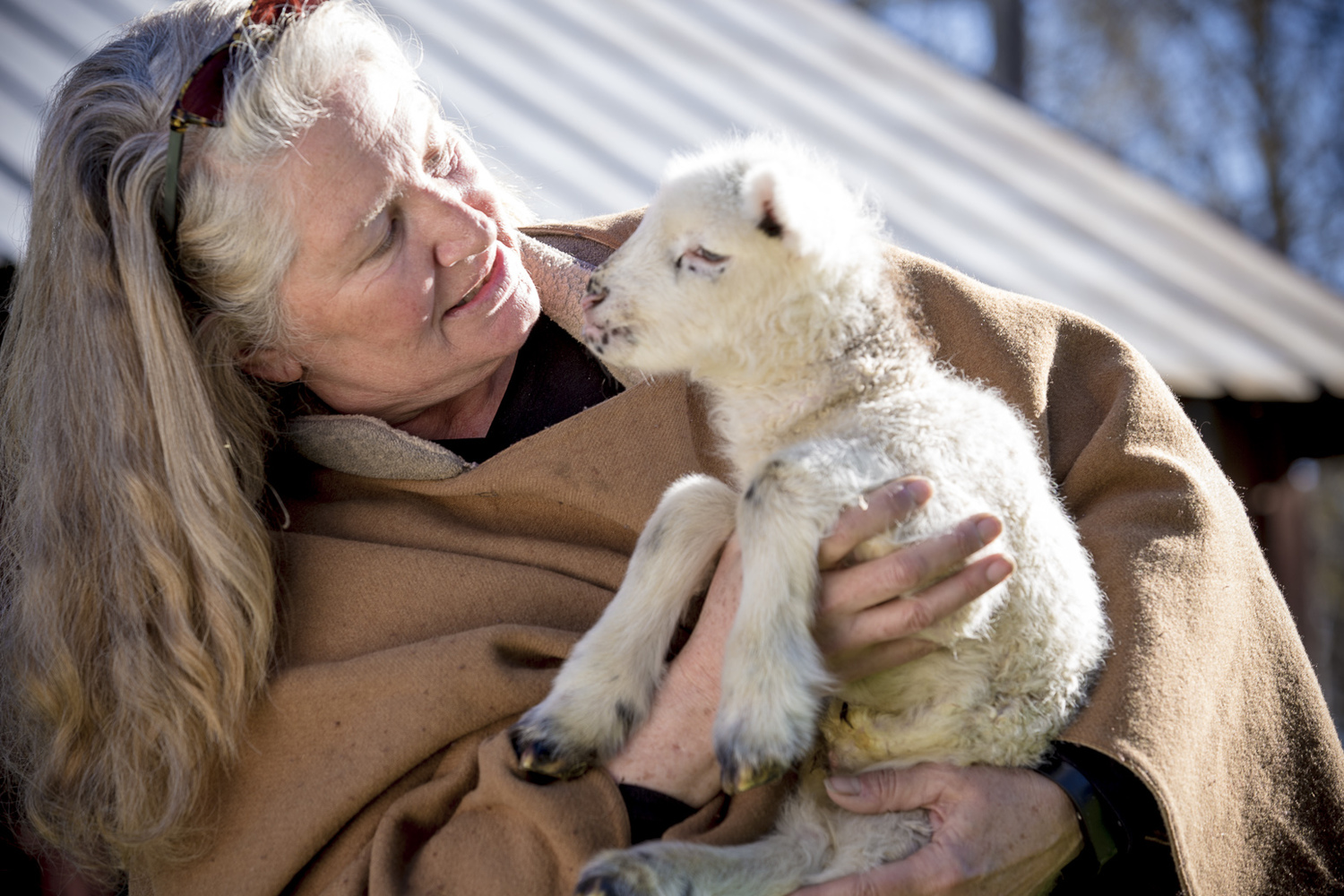
Olga Elder with one of her lambs at Stoney Mountain Farm in Alamance County. She has leveraged support from NRCS to install fencing and water lines for her rotational grazing system.
- Visiting Chapel Hill Creamery to learn about heavy use area protection, fencing, and prescribed grazing;
- Exploring Fickle Creek Farm to see access control, livestock pipeline, heavy use area protection, and high tunnel systems;
- Touring the Student Organic Farm at Central Carolina Community College to observe high tunnels, cover crops, hedgerow planting, and more; and
- Witnessing buffalo management at Sunset Ridge Buffalo Farm, including fencing, watering facilities, and prescribed grazing.
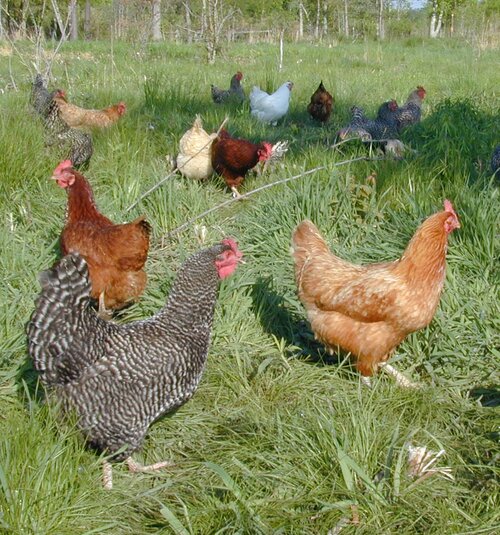
Nutrient cycling is an important way of managing manure and fertilizing pastures. You can learn more about practices like these at Fickle Creek Farm in Efland on the Piedmont Farm Tour.
If you are interested in implementing conservation practices on your own farm, participating in this tour will give you valuable insights and connections. The NC Conservation Outreach Project is dedicated to helping producers learn about practices that can improve farm sustainability and profitability.
About the Partnership
The NC Conservation Outreach Project (NCCOP) works to connect farmers with resources and information about NRCS conservation practices. The Carolina Farm Stewardship Association, established in 1979, promotes sustainable agriculture and food systems throughout the Carolinas. Together, these organizations are highlighting the real-world implementation of conservation practices that benefit both agricultural productivity and environmental health.
This Piedmont Farm Tour marks NCCOP’s first outreach event, with more planned throughout the state over the next two years. Future events will include field days and multi-site tours in various regions of North Carolina. Additionally, NCCOP expects to launch a mobile app for farmers later this year, which will provide interactive information to help producers connect with NRCS staff and resources in their region.
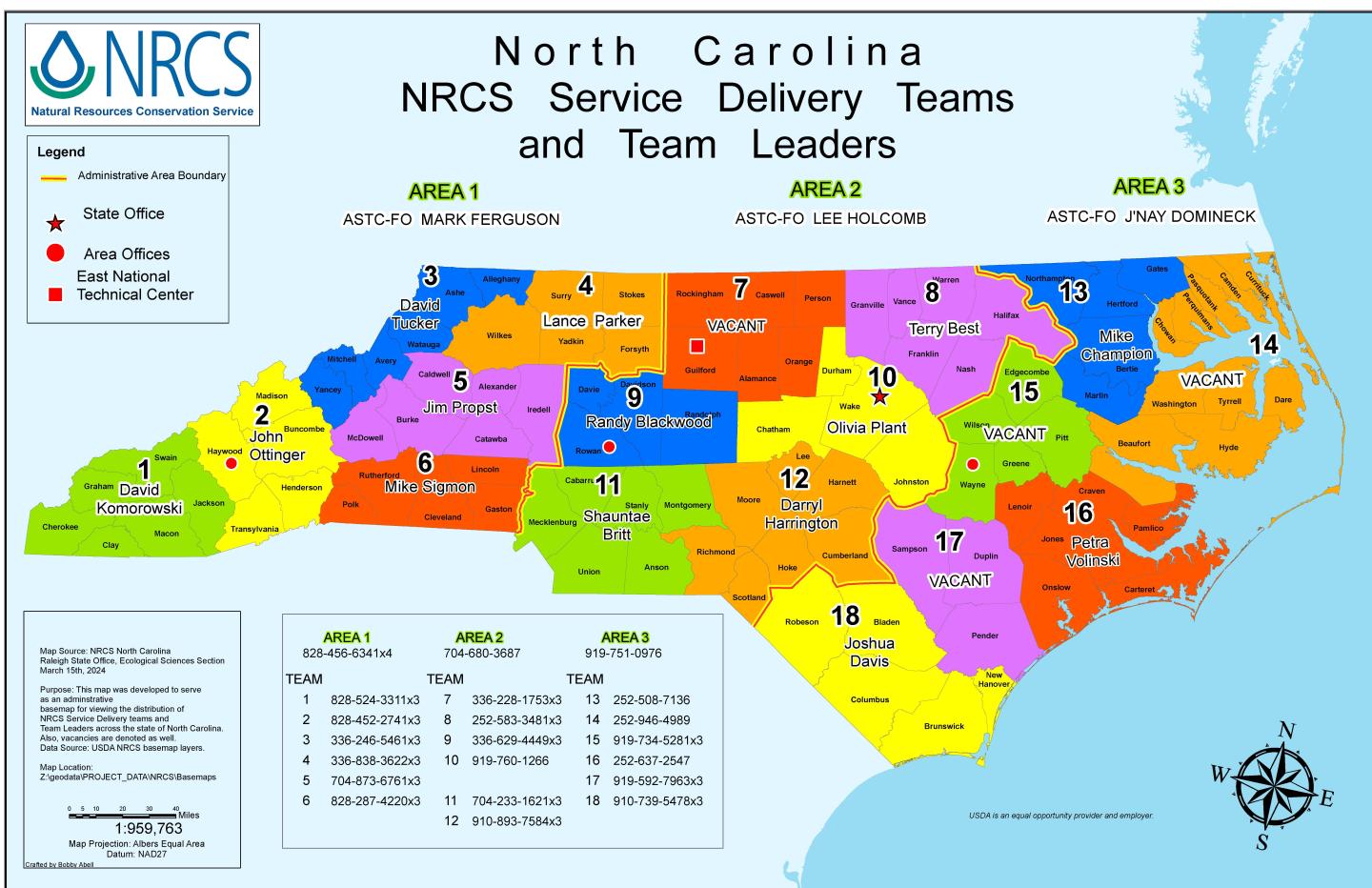
The NRCS has conservation specialists serving every county in NC. They work with farmers to improve efficiency, reduce waste, all while ensuring that our soil and water are preserved for future generations.
The NRCS (Natural Resources Conservation Service) provides farmers with technical and financial assistance to implement conservation practices. These practices help improve soil health, water quality, wildlife habitat, and farm productivity while reducing environmental impacts. By seeing these practices implemented on working farms, producers can better understand how they might adapt similar approaches to their own operations.
For More Information
Details about all participating farms are available on our website, which is directly linked from the main CFSA Piedmont Farm Tour site. The tour takes place on Saturday and Sunday April 26 & 27, from 2-6 p.m. Tickets can be purchased through CFSA. For more information about the conservation practices featured on the tour, visit the farms listed or contact us directly.
The Carolina Farm Stewardship Association’s Piedmont Farm Tour connects the public with a variety of farmers, many of whom have implemented NRCS conservation practices.
Piedmont Farm Tour Participating Farms with NRCS Conservation Practices
Download and print a guide to take with you on the tour!
- Chapel Hill Creamery 615 Chapel Hill Creamery Rd, Chapel Hill, NC 27516 (Portia McKnight)
- Heavy Use Area Protection (561)
- Fence (382)
- Prescribed Grazing (528)
- Faithfull Farms 1400 Ferguson Rd, Chapel Hill, NC 27516 (Howard Allen)
- High Tunnel System (325)
- Fickle Creek Farm 211 Fickle Creek Crossing, Efland, NC 27243 (Bryan Horton)
- Access Control (472)
- Livestock Pipeline (516)
- Heavy Use Area Protection (561)
- High Tunnel System (325)
- Granite Springs Farm 266 Granite Springs Rd, Pittsboro, NC 27312 (Meredith Leight)
- Forest Management Plan (106)
- High Tunnel System (325)
- Hawk’s Nest Healing Gardens 1205 N Mineral Springs Rd, Durham, NC 27703 (Hector Lopez)
- High Tunnel System (325)
- Minka Farm 120 Minka Farm Ln, Efland, NC 27243 (Kim Harry)
- Livestock Pipeline (516)
- Prescribed Grazing (528)
- Forage and Biomass Planting (512)
- Parker Farm & Vineyard 2059 Laws Store Rd, Hurdle Mills, NC 27541 (Ashley Parker)
- Nutrient Management (590)
- Residue and Tillage Management, No Till (329)
- Grassed Waterway (412)
- Sankofa Farms 2916 J A Killough Dr, Cedar Grove, NC 27231 (Kamal Bell)
- High Tunnel System (325)
- Irrigation Water Management (449)
- Stoney Mountain Farm 6559 Old Stoney Mountain Rd, Burlington, NC 27217 (Olga Elder)
- Fence (382)
- Pipeline (516)
- Watering Facility (614)
- Student Organic Farm at Central Carolina Community College764 West St, Pittsboro, NC 27312. (Farrell Moose)
- High Tunnel System (325)
- Cover Crop (340)
- Hedgerow Planting (422)
- Critical Area Planting (342)
- Grassed Waterway (412)
- Structure for Water Control (587)
- Sunset Ridge Buffalo Farm 465 Yarborough Rd, Roxboro, NC 27574. (Jack Pleasant)
- Fence (382)
- Pipeline (516)
- Watering Facility (614)
- Prescribed Grazing (528)
- Structure for Water Control (587)
To receive future notices of outreach efforts, please complete this form.
Please direct questions to: Chas Edens NC Conservation Outreach Project (NCCOP) cmedens@ncsu.edu



